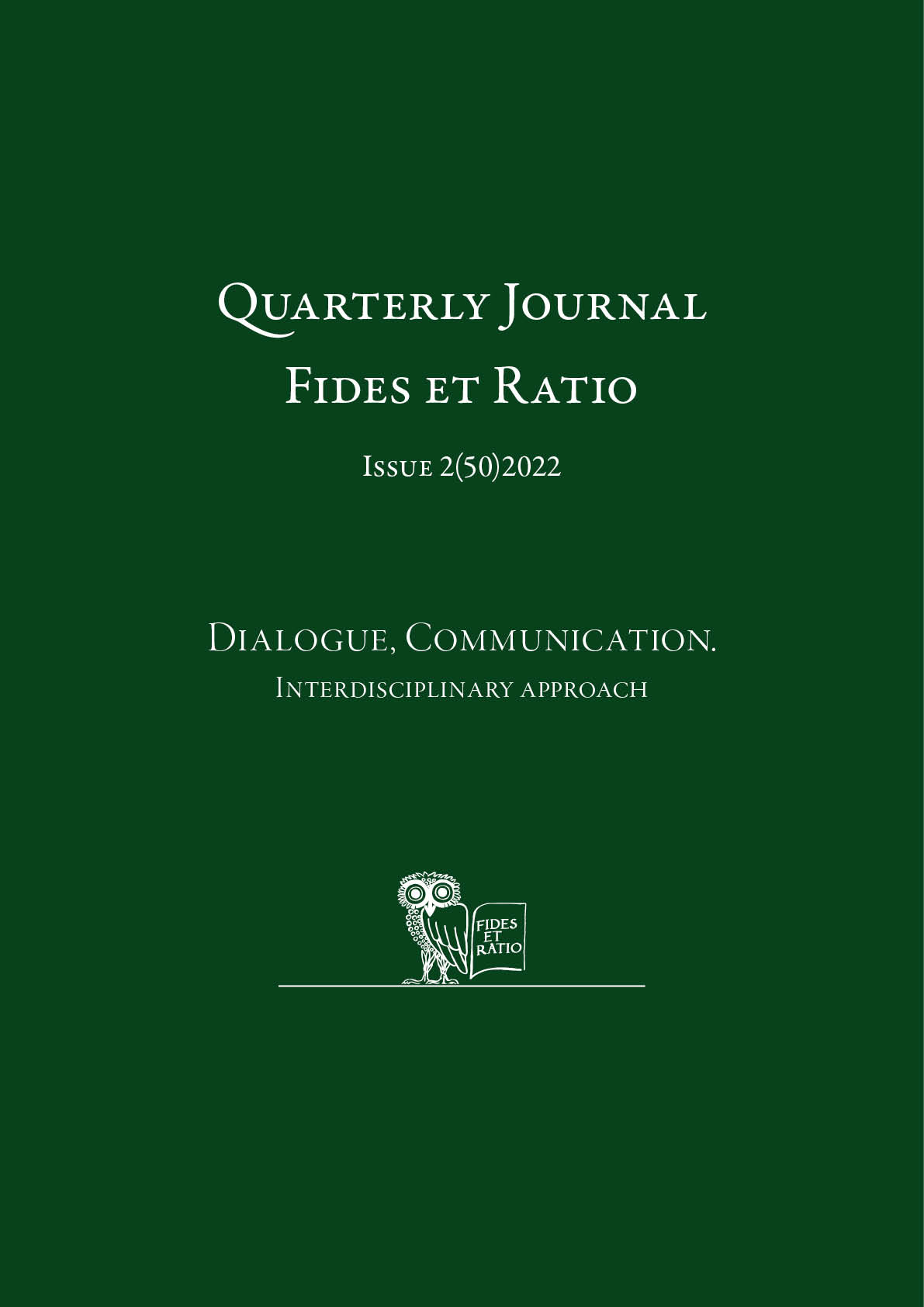Abstract
The aim of this paper is to outline the issue of communication in logotherapy on the basis of existential communication, which is the foundation of phenomenological cognition of another human being. The basic assumptions of logotherapy have been presented in the context of the issue of the location of psychotherapy in relation to the question of its essence, and at the same time the basic catalyst for therapeutic change – the techniques developed on the basis of empirical evidence, or a therapeutic relationship. The next part of the article outlines the form of existential communication according to K. Jaspers in the context of phenomenological cognition of another human being. On the background of logotherapy, the meeting of Me and You, full of authentic acceptance and devoid of ready-made interpretative patterns, allows us to discover the freedom “to”, which provides a space for authentic selection and implementation of values, taking responsibility for one’s own existence, and consequently – experiencing the meaning of life.
References
Aleksandrowicz, J. (2000). Psychoterapia. Podręcznik dla studentów, lekarzy i psychologów. Warszawa: Wydawnictwo Lekarskie PZWL.
Allport, G.F. (1960). Personality and social encounter. Boston: Beacon Press.
Chrząstowski, S. (2019). Praktyka psychoterapeutyczna oparta na danych naukowych–za i przeciw. Psychoterapia, 2(189), 45-57.
Cook, S.C., Schwartz, A.C., Kaslow, N.J. (2017). Evidence-Based Psychotherapy: Advantages and Challenges. Neurotherapeutics, 14, 537–545.
Czabała, J.C. (2006). Czynniki leczące w psychoterapii. Warszawa: Wydawnictwo PWN.
Dezelic, M.S., Ghanoum, G. (2015). Meaning-centered therapy manual. Logotherapy & existential analysis brief therapy protocol for group & individual sessions. Miami: Presence Press International.
Fabry, J.B. (1968). The pursuit of meaning: logotherapy applied to life. Boston: Beacon Press.
Fabry, J. (1981). The frontiers of logotherapy. The International Forum for Logotherapy, 4, 3–11.
Frankl, V. (1984). Homo Patiens. Logoterapia i jej kliniczne zastosowanie. Pluralizm nauk a jedność człowieka. Człowiek wolny. Warszawa: Instytut Wydawniczy Pax.
Frankl, V. (2017). Lekarz i dusza. Wprowadzenie do logoterapii i analizy egzystencjalnej. Warszawa: Czarna Owca.
Frankl, V. (2018). Wola sensu. Założenia i zastosowanie logoterapii. Warszawa: Czarna Owca.
Frankl, V. (2019). Człowiek w poszukiwaniu sensu. Warszawa: Czarna Owca.
Jaspers, K. (1991). Rozum i egzystencja. Nietzsche a chrześcijaństwo. Warszawa: PWN.
Jaspers, K. (1998). Wprowadzenie do filozofii. Warszawa: Wydawnictwo Siedmioróg.
Jaspers, K. (2009). Filozofia. Wprowadzenie do filozofii. Filo-Sofija, 9(9), 223-268.
Leontiev, D. (2016). Logotherapy beyond psychotherapy: dealing with the spiritual dimension. In: A. Batthyany (ed.), Logotherapy and existential analysis. Proceedings of the Viktor Frankl Institute Vienna. Volume 1. Wiedeń: Springer.
Lukas, E. (1998). Logotherapy textbook. Toronto: Liberty Press.
Lukas, E. (1999). “Key Words” as a guarantee against the imposition of values by the therapist. The IFL, 22(1), 1-7.
Marshall, M., Marshall, E. (2012). Logotherapy revisited. Review of the tenets of Viktor E. Frank’s logotherapy. Ottawa, Ontario: Ottawa Institute of Logotherapy.
Norcross, J.C. (2010). The therapeutic relationship. In: B.L. Duncan, S.D. Miller, B.E. Wampold, M.A. Humble (eds.), The heart and soul of change: Delivering what works in therapy. Washington: American Psychological Association.
Popielski, K. (2018). Noetyczny wymiar osobowości. Psychologiczna analiza sensu życia. Lublin: Institute of Biofeedback and Noo-psychosomatic.
Schulenberg, S.E., Nassif, C., Hutzell, R.R., Rogina, J.M. (2008). Logotherapy for clinical practice. Psychotherapy Theory, Research, Practice, Training, 45(4), 447-463.
Trzebińska, E. (2005). Kontakt. W: L. Grzesiuk (red.), Psychoterapia. Teoria. Podręcznik akademicki. Warszawa: Eneteia.
Wachtel, P.L. (2012). Komunikacja terapeutyczna. Kraków: Wydawnictwo Uniwersytetu Jagiellońskiego.
Żelazny, M. (2011). Filozofia i psychologia egzystencjalna. Toruń: Wydawnictwo Naukowe Uniwersytetu Mikołaja Kopernika.

